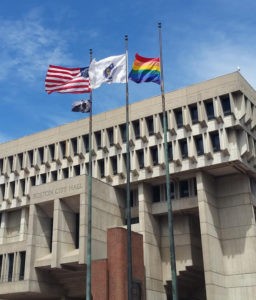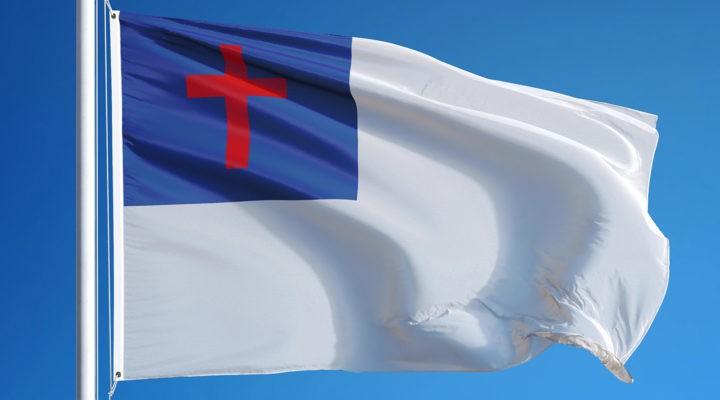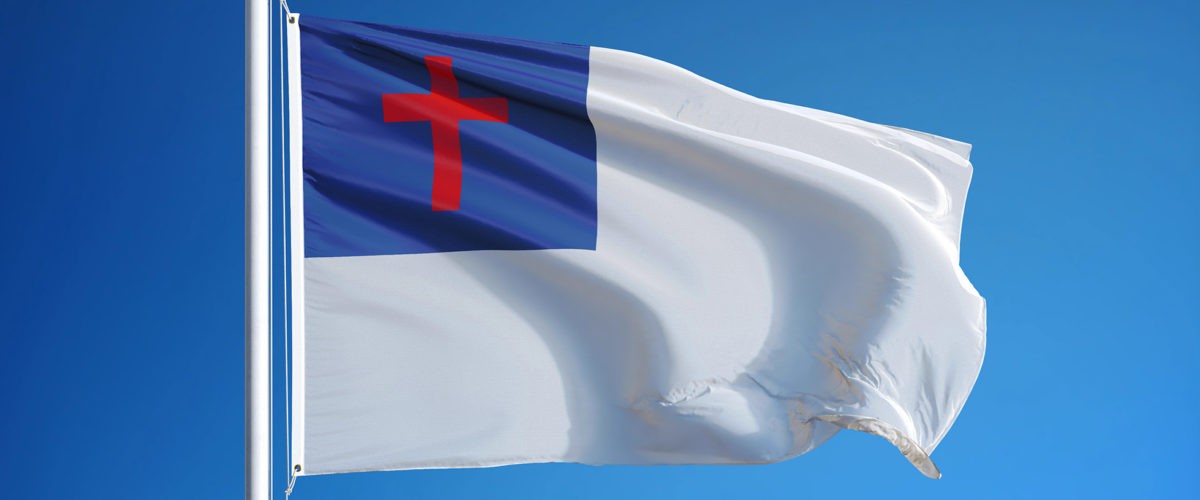A conservative Christian group challenging the City of Boston before the United States Supreme Court has landed support from two unlikely allies — the American Civil Liberties Union and the Biden administration.
At issue is a request by a Christian civic group, Camp Constitution, for the City of Boston to allow a Christian flag to fly on one of two City Hall flagpoles commonly used by civic groups and movements. The city offers groups the opportunity to fly their flags briefly on the two poles to encourage civic engagement.
The city had allowed at least 284 private organizations to raise their flags and never had turned down a request until Camp Constitution asked to fly what is commonly known as the “Christian flag” — a white background with a blue square at the upper-left corner containing a red cross. The group wanted to fly the flag for about an hour on Constitution Day 2017, to commemorate Constitution Day “and the civic and cultural contributions of the Christian community to the city of Boston, the Commonwealth of Massachusetts, religious tolerance, the rule of law and the U.S. Constitution.”

Flags at Boston City Hall (City of Boston image)
Camp Constitution’s request was denied because the group wanted to fly the flag of a single religion, which city leaders feared would place them in violation of the First Amendment’s Establishment Clause, which says government may not give preferential treatment to one religion over other religions.
The ACLU argument
The City of Boston was wrong in this situation, according to the ACLU, which more often finds itself fighting attempts by Christian groups to get special privilege or dominate in the public square.
When a lower court upheld the city’s decision, it set a precedent that “if upheld, would dangerously expand the government-speech doctrine,” the ACLU said in its friend-of-the-court brief supporting Camp Constitution. “Through its policies and practices, the city designated its third flagpole a public forum for temporary flag displays by private parties. Having done so, the city is bound by the constitutional principles governing public forums. Those principles prohibit the city from denying private speakers access to the forum based on their viewpoints, including religious viewpoints. The First Circuit, however, allowed the city to avoid the prohibition against viewpoint discrimination by erroneously reclassifying a forum for private speech as nothing more than a venue for government speech.”
In sum, the ACLU argues, “The First Circuit not only misapplied the public-forum doctrine, but also extended this court’s government-speech precedents beyond their appropriate reach.”
Among its arguments, the ACLU notes that the Boston flagpole is not a permanent monument or memorial that could be considered government speech and the city does not exercise complete control over the content of the flags flow on the city-owned poles.
“Before this case, the city had an unbroken record of rubber-stamping flag-raising applications, often without even seeing the flags in question,” the brief states. “Thus … the city is not selecting the messages that it wishes to convey as a speaker. Instead, it is providing a forum for private parties to convey their own messages — as long as those messages are not religious. By denying access to a forum to persons expressing religious viewpoints, the city is regulating private speech, not crafting government speech.”
“By denying access to a forum to persons expressing religious viewpoints, the city is regulating private speech, not crafting government speech.”
Nor does Camp Constitution’s request violate the Establishment Clause of the First Amendment’s religious liberty protections, the ACLU adds.
“The city’s concern was understandable, as displaying a Christian flag (or any religious flag) on government property, especially near a city hall, would in many cases raise serious Establishment Clause problems. Those problems are not present here, however, because the city designated its third flagpole a forum for temporary flag displays by private parties, and the forum has functioned as intended by accommodating numerous speakers and viewpoints. In these circumstances, it would not violate the Establishment Clause to allow Camp Constitution to display its flag for a single hour, on terms no different than those applicable to scores of other private parties before it.”
The Justice Department argument
A brief filed by the U.S. Justice Department, also supporting Camp Constitution, notes the federal government has a substantial interest in the outcome of this case “because federal governmental entities manage a variety of programs in which private speakers participate.”
It explains: “For example, the National Park Service manages hundreds of park units in which demonstrations, special events, and government-sponsored events may occur. And the United States Postal Service manages a program in which members of the public may design custom postmarks. The extent to which those and other programs constitute government speech has important consequences for the management and regulation of those programs.”
The Justice Department contends that the City of Boston’s flag-raising program “is not government speech, but instead a forum for private speech. The Court should therefore reverse the decision below. In so doing, however, the court should reaffirm that the First Amendment affords the city and other governments ample latitude to craft expressive programs — including programs involving contributions from private parties — without relinquishing their right to control the message or exclude other private speakers.”
This question of what constitutes government speech and what constitutes private speech is the heart of this case, according to the Justice Department.
This question of what constitutes government speech and what constitutes private speech is the heart of this case, according to the Justice Department.
And in Boston, “the city’s flag-raising program is not government speech. Most important, the city typically exercises no input into or control over the choice of flags or the content of the events at which they are raised. Instead, the city has made its flagpole generally avail- able to a variety of private groups, approving all 284 applications it received in the 12 years before this case arose — usually without even reviewing the flags.”
Because of the nature of the Boston program, “the public would not reasonably attribute the flags flown during frequent private flag-raising events to the city — just as they would not reasonably attribute to the city the messages conveyed by the associated events on the plaza below. Finally, the flags are flown only temporarily and remain the property of the private parties.”
When viewed as a forum for private speech, excluding a group because of its religious nature becomes discriminatory, the Justice Department continues.
“Because the flag-raising program is a forum for private speech, the city’s denial of petitioners’ application violated the First Amendment. … The First Amendment permits reasonable content- and speaker-based restrictions in some of those forums, but it prohibits viewpoint discrimination in all of them.”
“The city cannot generally open its flagpole to flags from private civic and social groups while excluding otherwise-similar groups with religious views.”
In Boston, the City denied the application “only because petitioners’ flag was described as religious. This court has long held that denying access to an otherwise-available forum simply because of the religious nature of the speech is viewpoint discrimination. The city cannot generally open its flagpole to flags from private civic and social groups while excluding otherwise-similar groups with religious views.”
The case, Harold Shurtleff v. City of Boston, has drawn numerous friend-of-the-court briefs, mainly from conservative Christians groups but also from the states of Kentucky, Arizona, Arkansas, Georgia, Louisiana, Missouri, Montana, Nebraska, South Carolina, Tennessee, Utah and West Virginia.
The Supreme Court is slated to take up the case on Jan. 22.
Related articles:
BJC offers timely answers to questions about religious liberty


